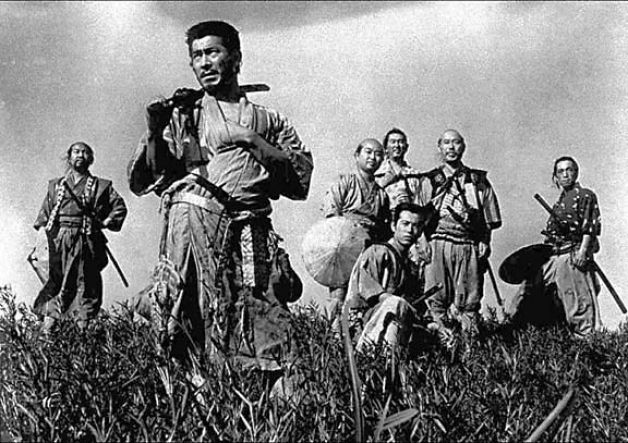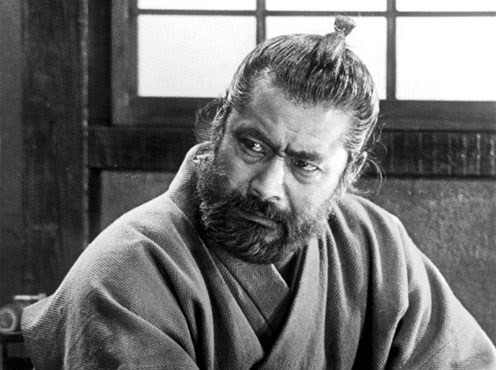
“There is nothing that says more about its creator than the work itself.”
- Akira Kurosawa (1910-1998)
We all have our own criteria for what we want in the art we consume (as well as make, for the creative types among us). My personal favorite outlook is best summed up in a quote from the 2011 movie Midnight in Paris, a movie which partially takes place amongst American ex-patriot writers in Paris during the 1920s. In it, Gertrude Stein's character says the following: "we all fear death and question our place in the universe. The artist's job is not to succumb to despair, but to find an antidote for the emptiness of existence." To make us question things, but also attempt to give us answers, whether it moves or angers or inspires us- this is my favorite type of art*.
Akira Kurosawa is, to me, one of the best film makers that fit that criteria. Kurosawa started film making during World War 2. His earlier films were movies he created reluctantly, not because he wasn't sure about his passion for cinema, but because he was coerced into putting nationalistic propaganda into his films (which, it is important to note, happens in almost every country during war). His film The Most Beautiful was a straight Japanese propaganda film, while films like Sanshiro Sugata and its sequel had elements of it. After the war ended, he began to make movies with much more artistic freedom, and after continuing to refine his craft gave us some of the best films that the world has ever seen.
Rather than go through every movie of his I have seen, I will go through my five favorites and talk about them briefly. Oddly enough, the order I saw them in happens to coincide with the the order they were chronologically released, so going in order will be easy.

Ikiru (1952)
The first movie of his I saw was Ikiru. It actually happened to be airing on the UC San Diego channel when I was bored one day in my apartment. I remember reading the description and seeing Kurosawa's name. I thought to myself "hey, I've heard of this Kurosawa fella. His movies are supposed to be pretty good. I'll give this a try, I guess." I watched the movie, going from mildly interested to engaged to moved to the verge of tears.
The movie follows an old man who finds out he has cancer (not too different a concept from Ingmar Bergman's Wild Strawberries, another great film, though the execution is quite different). Knowing he will die soon, the main character tries to talk to his family about it, only to find himself unable to because of how little they seem to care. He then tries escape in the nightlife of bars and clubs, before realizing that won't work for him. Eventually, thanks to inspiration from a young woman he befriends, he decides he will dedicate the rest of his life to one final good deed: using his position as a bureaucrat to convert an unused plot of land into a public park that children can play in.
The film's title means "to live" in Japanese, and that's what this film is all about: how short life can be, and how crucial it is to find a purpose we find meaningful while we are here. Ikiru gives us a protagonist who struggles with these same issues, but on a much more limited timeline, and therefore with a greater sense of urgency, which leads to some extraordinarily poignant moments. Whats great about the goal is how grounded it is- this isn't about saving the world from a plague or an alien invasion or new M Night Shyamalan movie. This is about a realistic, seemingly small way of doing some genuine good in the world before leaving it. Not only are the issues he struggles with real, but the way he deals with them provide us a realistic idea on how to face them ourselves.

Seven Samurai (1954)
The next movie I saw was his most famous work, especially in the international film community: Seven Samurai. The film is about a peasant village that gathers up seven samurai to help stop a group of bandits from raiding their town. I have already written a review for it here, on my friend David Zafra's blog, so check that out if you want an in depth review.
While Ikiru is about how to live life amidst all its struggles and complexities, Seven Samurai critiques close adherence to social roles as a way of life. It doesn't do it in a way that condemns the people involved, however, but the roles themselves. Peasants are desperate and tricky, but as Toshiro Mifune's character reminds us, it's because the poverty and violence they face (from both bandits and the feudal system itself) force them to be. Samurai, meanwhile, might be sword wielding badasses, but they also know only violence and loss, and are usually left out of the celebration when those they fight for are victorious. Everyone here is just playing their societal role, and the toll it takes is evident.

Yojimbo (1961)/Sanjuro (1962)
The next two films of his I saw were actually related- Yojimbo and its semi-sequel, Sanjuro. The two are connected only by their protagonist, a nameless wandering samurai played by Toshiro Mifune. In both, this wandering samurai sees problems going on and decides to try to help to fix them. He does this because he wants to help, and being a badass is the only way he knows how.
An interesting aspect of these films is how they thematically tie together. Yojimbo critiques the tradition idea of a samurai, or really any feudal warrior who enforces the status quo, by featuring an impolite but caring protagonist who eschews tradition and does things in his own unorthodox yet strategic way. Sanjuro takes it a step further, in the direction of self-awareness. It recognizes that, while Yojimbo is a badass in more way than one, violence is still his primary means of action. Throughout Sanjuro, that reality begins to sink in more and more for the protagonist, and he tries to move away from it. He doesn't want to only be a killer, even if he is doing it for a just cause.
Ultimately, the two movies feature a protagonist who wants to do good, but through methods that might not be ideal. Who can't relate to that?

Red Beard (1965)
The final favorite of mine also happens to be my absolute favorite film of his, as well as my favorite movie of all time. Hows that for a conveniently lined up list?
Red Beard tells the story of a young doctor, Noboru Yasumoto, who wants to a bigshot doctor for the Shogun himself in early 19th century Japan. He is, against his wishes, transferred to a clinic in a poor rural town. The clinic is run by Kyojo Niide, known affectionately to the people there as Red Beard. Niide cares about his patients, and believes that emotional and mental healing is a crucial part of one's overall health. He also sees the link between poverty and poor health, both in the lack of resources impoverished communities are given and what is expected of them, and isn't afraid to be vocal about it.

Also, fuck tha police!
Throughout the film, Yasumoto begins to change as he sees a lot of the suffering going on and how Niide (as well as other medical staff and patients) deals with it. We explore the backstories of a few patients along the way, which examines how metaphorical ailments affect one's physical health as much as pathogenic ones do. Eventually, Yasumoto comes around and begins to care about how much good he is capable of as a well trained doctor. Vital to his journey is a young girl whom they rescue from a brothel and take back to help heal from a sickness she developed- yet she helps him heal when he becomes sick, as well.
In his Great Movies series, Roger Ebert said "I believe this film should be seen by every medical student." I agree, but would also take it a step further and say it should be seen by everyone. Like Ikiru, this film is about trying to find a meaningful existence that makes the world a slightly better place. An attempt to quell our own existential angst. It also, however, isn't afraid to take a stand about the oppression of poor people. This movie has so many layers to it, and it all plays out in such a beautiful, humanistic way.
When I think of Kurosawa's movies, I think of movies that both challenge societal conventions and challenge us to be the most compassionate people we can be. Not only for others, but for ourselves. They give us examples of what to strive for. While the characters encounter and deal with these challenges in their own specific contexts- most of us aren't samurai or 19th century feudal doctors (as far as I know)- the guiding ideas behind them are universal and what we ought to pay attention to. We might not be a samurai, for instance, but when watching Seven Samurai we can still think about how much society shapes who we are, and the effect that has on us. We might not be 19th century feudal doctors, but we can think about how what we do affects other people. That's what matters.
We all have to struggle with death and our place in the universe, but we don't have to do it alone. I have found two avenues that work best for me: the people around me and art. When it comes to the art of cinema, no one did it like Kurosawa. He remains an inspiration for me on both a personal and creative level, and I am certainly not alone in that sentiment. Naming a "greatest film director of all time" is a pointless concept to me, but he is without a doubt my favorite.
*when I say art, I mean it in the most general sense, including not only visual arts but other types of creative expression as well

